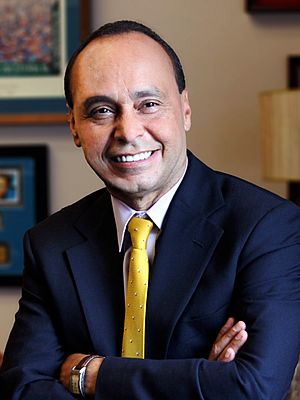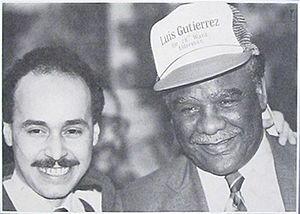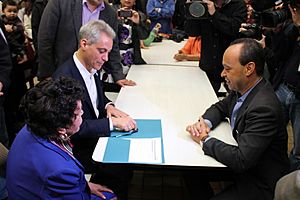Luis Gutiérrez facts for kids
Quick facts for kids
Luis Gutiérrez
|
|
|---|---|
 |
|
| Member of the U.S. House of Representatives from Illinois's 4th district |
|
| In office January 3, 1993 – January 3, 2019 |
|
| Preceded by | George Sangmeister |
| Succeeded by | Chuy García |
| Member of the Chicago City Council from Ward 26 |
|
| In office May 2, 1986 – December 12, 1992 |
|
| Preceded by | Michael Nardulli |
| Succeeded by | Billy Ocasio |
| Personal details | |
| Born |
Luis Moses Gutiérrez
December 10, 1953 Chicago, Illinois, U.S. |
| Political party | Democratic |
| Spouse |
Soraida Arocho
(m. 1977) |
| Children | 2 daughters |
| Education | Northeastern Illinois University (BA) |
| Signature | |
Luis Vicente Gutiérrez (born December 10, 1953) is an American politician who served in the United States House of Representatives for Illinois's 4th district from 1993 to 2019. Before joining Congress, he was a member of the Chicago City Council from 1986 to 1992.
Gutiérrez is a member of the Democratic Party. He is known for being a strong supporter of rights for workers, immigrants, and the LGBT community. He is of Puerto Rican heritage and has been a vocal supporter of Puerto Rican independence.
Because of his passionate speeches and political skill, his supporters gave him the nickname El Gallito, which means "the little fighting rooster."
His district in Chicago was known for its unusual "earmuff" shape. This shape was created through a process called gerrymandering to connect two large Hispanic neighborhoods into one district. This ensured that the community would have a Hispanic representative in Congress.
In November 2017, Gutiérrez announced he would not run for re-election. He retired from Congress in 2019 and now lives in Puerto Rico.
Contents
Early Life and Education
Gutiérrez was born and raised in Chicago. His mother worked on an assembly line, and his father was a taxi driver. When he was a teenager, his family moved back to their hometown in San Sebastián, Puerto Rico.
Moving to Puerto Rico was a big change for Gutiérrez. In Chicago, some people had treated him poorly because of his heritage. In Puerto Rico, some people called him gringo (a slang term for an American) because he was from the mainland. This experience helped him understand what it was like to be seen as an outsider. It was in Puerto Rico that he learned to speak Spanish fluently.
In 1974, Gutiérrez returned to Chicago and went to Northeastern Illinois University. He became involved in student groups that fought for social justice. He graduated in 1977 with a degree in English. After college, he worked as a taxi driver, a teacher, and a social worker for the state of Illinois.
Beginning a Career in Politics
First Campaign
In 1983, Gutiérrez decided to run for a local political position in Chicago. He ran against a very powerful and well-known politician, Dan Rostenkowski. To raise money for his campaign, Gutiérrez drove a taxi 14 hours a day, seven days a week. Even though he worked hard, he lost the election. However, this experience made him more determined to stay in politics.
Working with Mayor Harold Washington
Gutiérrez's hard work caught the attention of Chicago's first African-American mayor, Harold Washington. In 1984, Mayor Washington gave Gutiérrez a job in the city government. Gutiérrez became a trusted advisor to the mayor.
Winning a Seat on the City Council

In 1986, Gutiérrez ran for alderman of Chicago's 26th ward. An alderman is a member of the City Council, which helps run the city. Mayor Washington supported him, but he faced a tough opponent. The election was very close, but Gutiérrez won.
As an alderman, Gutiérrez became a leader in the City Council. He was known as a hard worker who fought for his community. He supported laws to protect gay people from discrimination and worked to create more affordable housing.
Serving in the U.S. House of Representatives
Elections and a Famous District
In 1992, Gutiérrez ran for the U.S. Congress. He won the election and became the representative for Illinois's 4th congressional district. This district was specially drawn to include two large Hispanic areas of Chicago. Its shape looked like a pair of earmuffs, connecting the neighborhoods with a thin strip of land. This made sure the large Hispanic population had a voice in Congress. Gutiérrez was re-elected many times, usually with a large majority of the vote.
Work in Congress
As a congressman, Gutiérrez focused on several key issues. He was a leading voice on immigration, consumer rights, and support for veterans.
Immigration and Civil Rights
Gutiérrez was a passionate advocate for immigrants. He was often called the "leading strategist and spokesperson on immigration issues" in Congress. He was the first to introduce a version of the DREAM Act, a bill to help young, undocumented immigrants who grew up in the U.S. become citizens.

He often participated in non-violent protests to bring attention to the need for immigration reform. He was arrested several times during these peaceful protests, including outside the White House. In his district, his office helped over 50,000 people apply for U.S. citizenship.
Consumer and Worker Rights
Gutiérrez also worked to protect consumers. He introduced a bill to limit the high interest rates charged by payday lenders. He also helped change a law to make big banks pay more to protect the money people deposit in them.
He was a strong ally of labor unions and fought for workers' rights. In 2008, he helped workers at a Chicago factory who had lost their jobs without warning. He helped them negotiate a deal with Bank of America.
Support for Puerto Rico
Gutiérrez was a strong defender of the people of Puerto Rico. In the 1990s and 2000s, he joined protests to stop the U.S. Navy from using the island of Vieques for bombing practice. He was even arrested during one of these protests. The movement was successful, and the Navy stopped using the island in 2003.
Personal Life
Gutiérrez married his wife, Soraida Arocho, in 1977. They have two daughters, Omaira and Jessica. Jessica's middle name is Washington, in honor of Mayor Harold Washington, who was a close friend and mentor to Gutiérrez.
 | George Robert Carruthers |
 | Patricia Bath |
 | Jan Ernst Matzeliger |
 | Alexander Miles |

